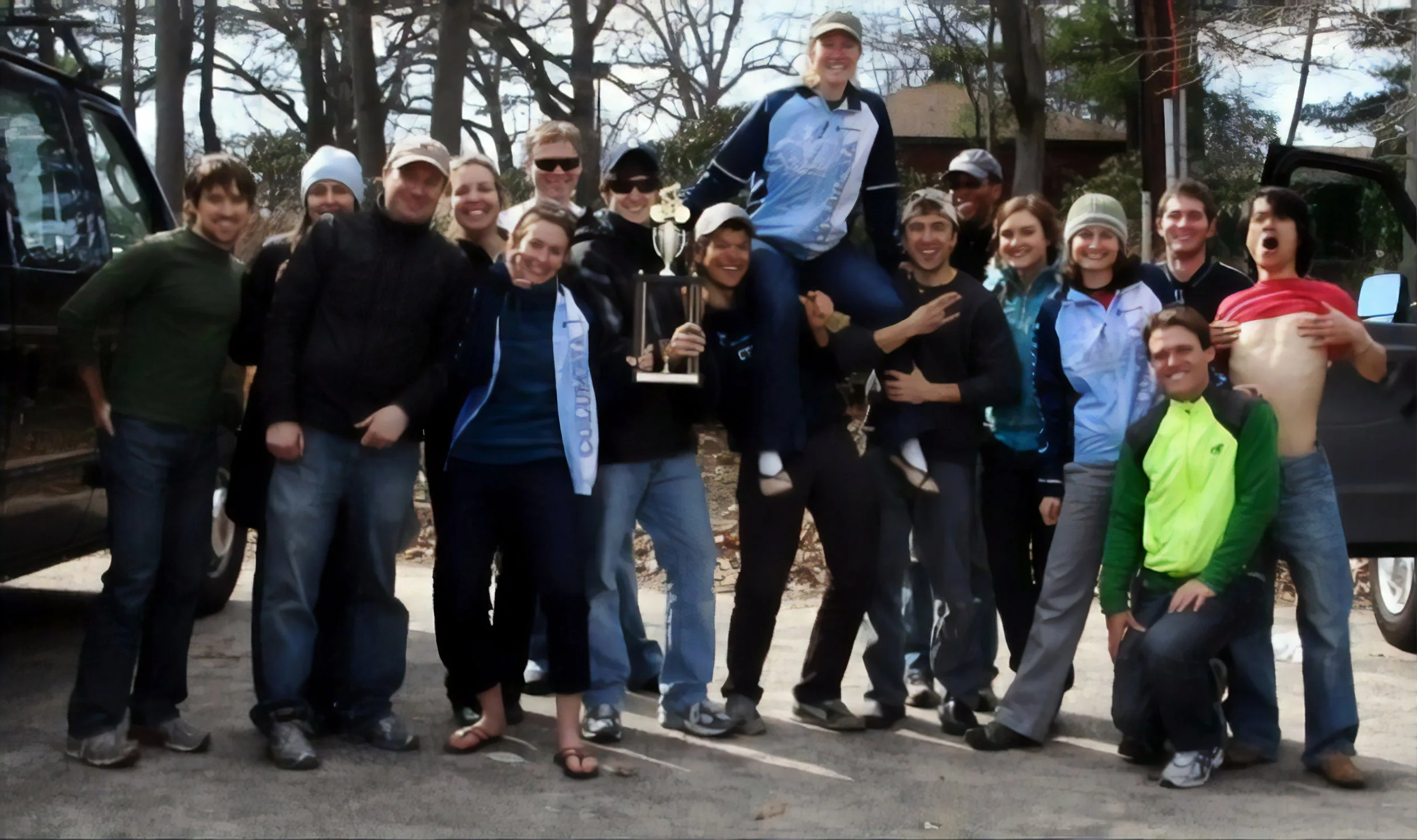Longevity or the Art of Continually Banging Your Head Against a Wall
At one point, rolling through the start/finish-line of the recent Reading Radsport Criterium, I could vaguely hear the race announcer refer to my time as a member of the Columbia University Cycling Team. The very mention of my time as a part of that squad conjures up the fondest of memories (15 undergrad and grad students crammed into a van discussing the intrinsic value of a morning bowel movement is surely the type of rousing conversation of which Socrates could only dream), but it also makes me wonder, what am I still doing here? How have I sustained interest in pedaling a bicycle, often in circles, through years of middle-of-the-pack racing and dry spells in results?
Columbia University Cycling: Too many years ago to count (and definitely before high res. photography was the norm) but, recognize any of these folks?
As a late starter in a sport whose success rewards the capriciousness of youth, I never had the sense that every performance in a race meant everything to me. Successes felt good, failures were lessons to be learned, but never did I grow to feel that my results sheet defined me. Cycling was, is, and will always be a way to counterbalance the responsibilities and expectations of real life. Early involvement in the sport may be the standard in terms of professional success, but many of those juniors who learn to treat cycling as a career trajectory rather than a hobby are prone to burnout when they reach perceived plateaus in ability and results.
Longevity. In a sport impacted regularly by injuries, obligations, and burnout, I have managed to calendar over 10 years as a racer since moving to NYC. Oddly enough, I think that part of my longevity in this sport is owed to those very three things: injuries, obligations, and burnout.
Injuries. Like many, I have been injured as a result of my two-wheeled pursuits. It’s strange to say that the sport I inched into to defer stress-related injuries as a runner has led to lost skin, a separated shoulder, torn meniscus, and a fractured jaw among other things. (I’m pretty sure this also means cycling has allowed me to further embrace my childhood obsession with X-Men’s Wolverine.) Seeing cycling as a hobby rather than the end-all, has allowed me to take the time to heal appropriately from these setbacks rather than rushing back into the sport and risking longer-term bodily or psychological damage. Additionally, I haven’t been afraid to end a season early, taking a long-term view of preserving my ability to enjoy sport rather than rushing back in when I was not ready.
Obligations. I am, have been, and always will be a cyclist with a job rather than a cyclist for a job. Long ago (maybe in college, or maybe in some random book), I read that the best way to hurt someone’s interest in a hobby is to start to pay them for it. I see shades of this echoed in my students who enter high school rosy eyed about the prospect of painting and drawing endlessly for the rest of their lives only to leave 4 years later scraping the bottom of the barrel of motivation to produce last-minute sketches for class assignments. Riding, training, and racing as their own rewards allow to long term cyclist to develop the intrinsic motivation needed to continually straddle a bike and roll out the door. Obligations such as work and real-world demands provide a valuable counterpoint that both enable cyclists to sustain the hobby and provide them with a reason to pursue it. Sport for sport’s sake.
Burnout. Similar to my thoughts on injury above, I think it’s vitally important to be able to recognize when you need a break. That break does not always have to mean putting down the bike for an extended period of time, but it can mean a change of scenery, a break from racing, loose adherence to a training plan, or even allowing yourself the occasional trip to McDonald’s. Mental recovery from the stresses of long racing seasons have allowed me to persist through many more of them than if I continually forced myself to wage two-wheeled war at the times when I simply was not feeling it.
What else helps others maintain their longevity in this (and other) sport?
